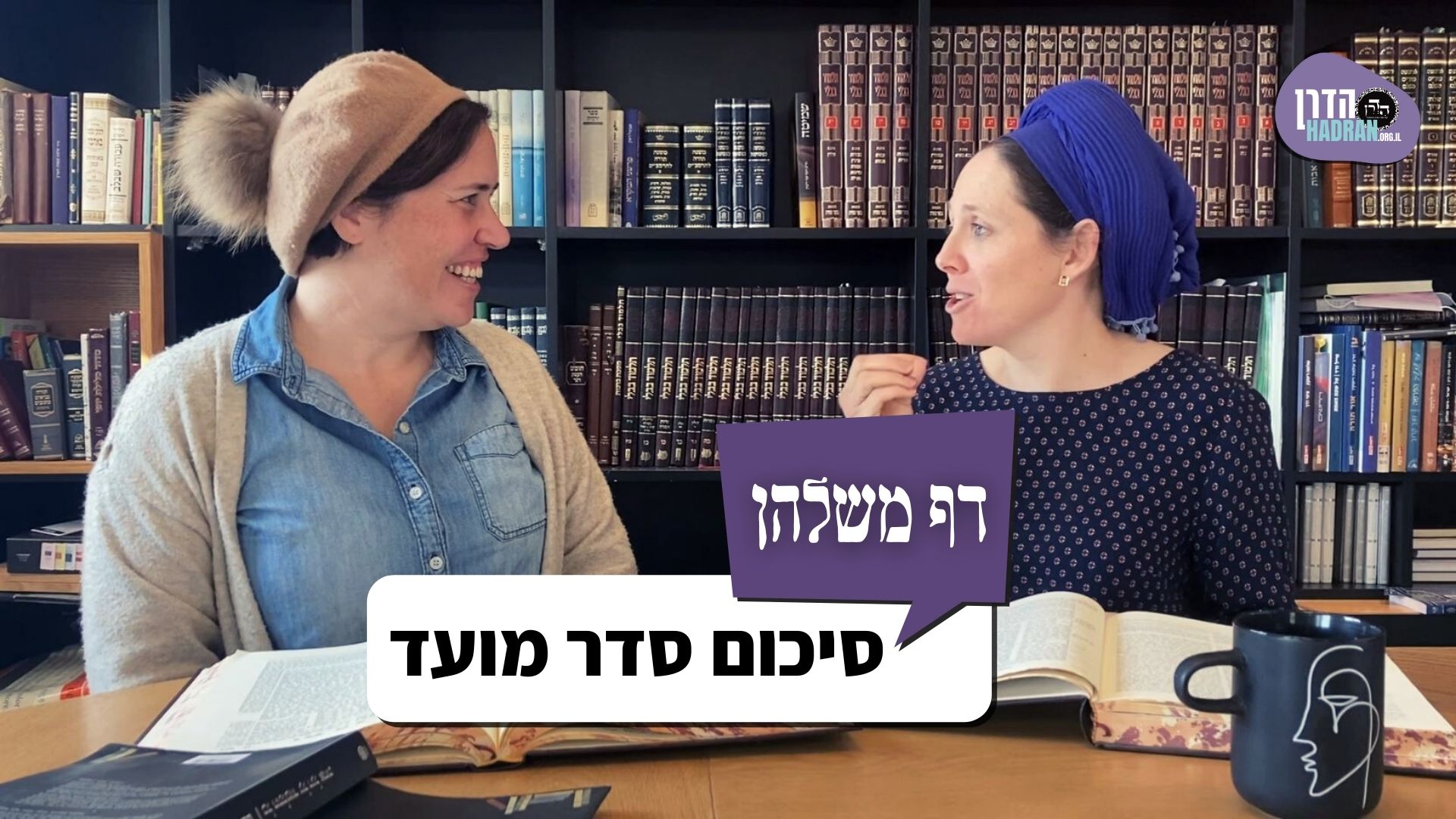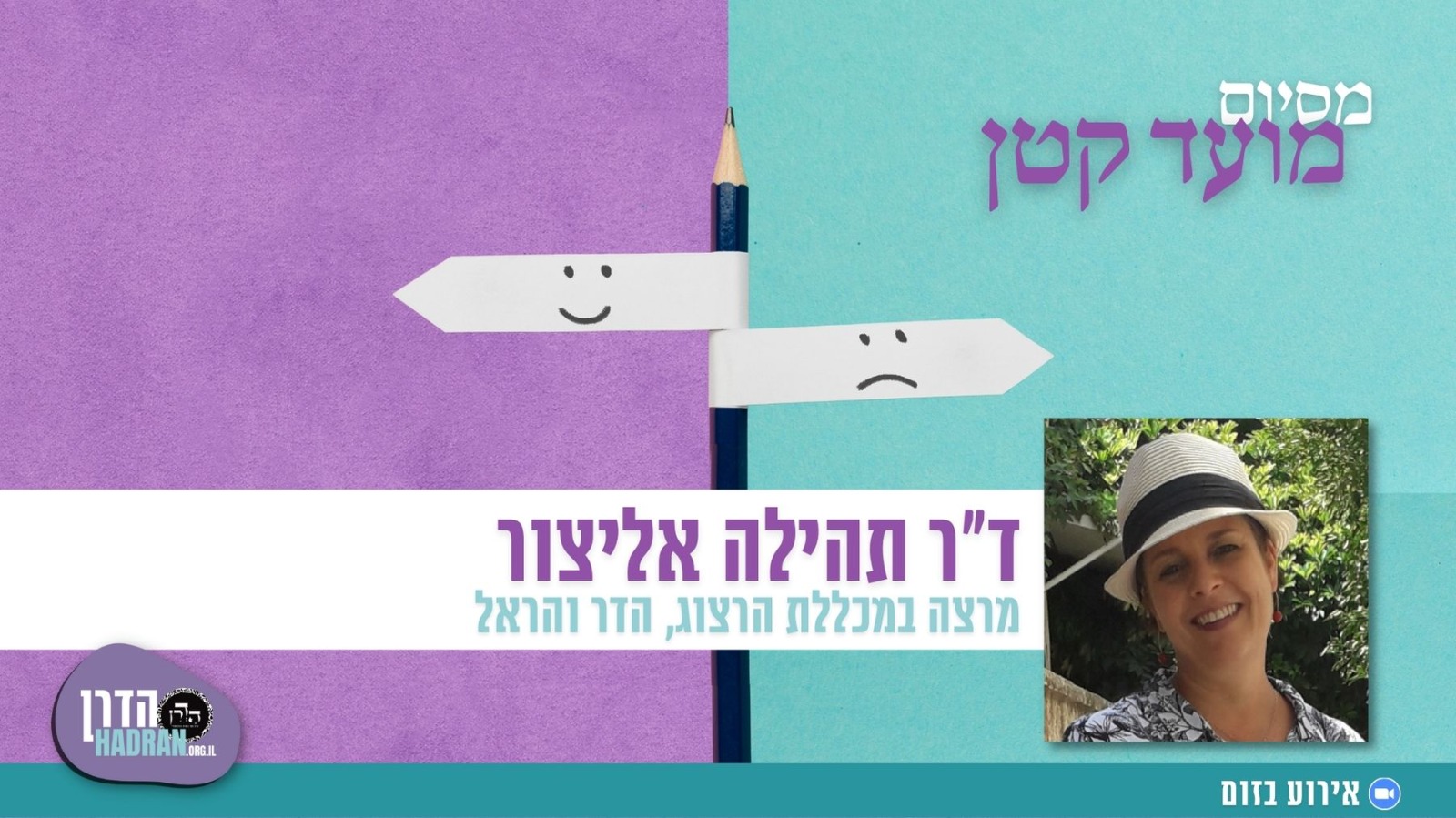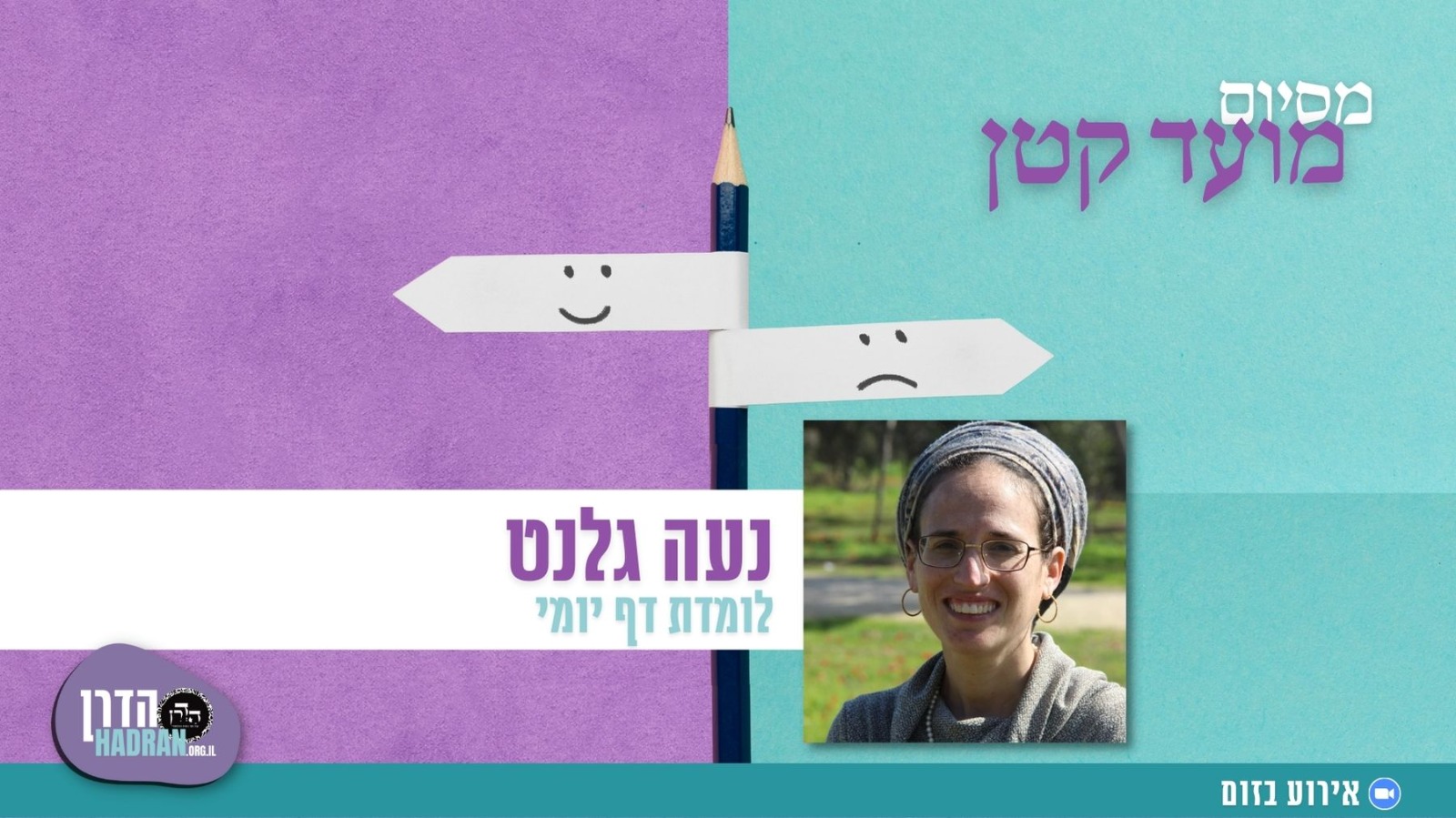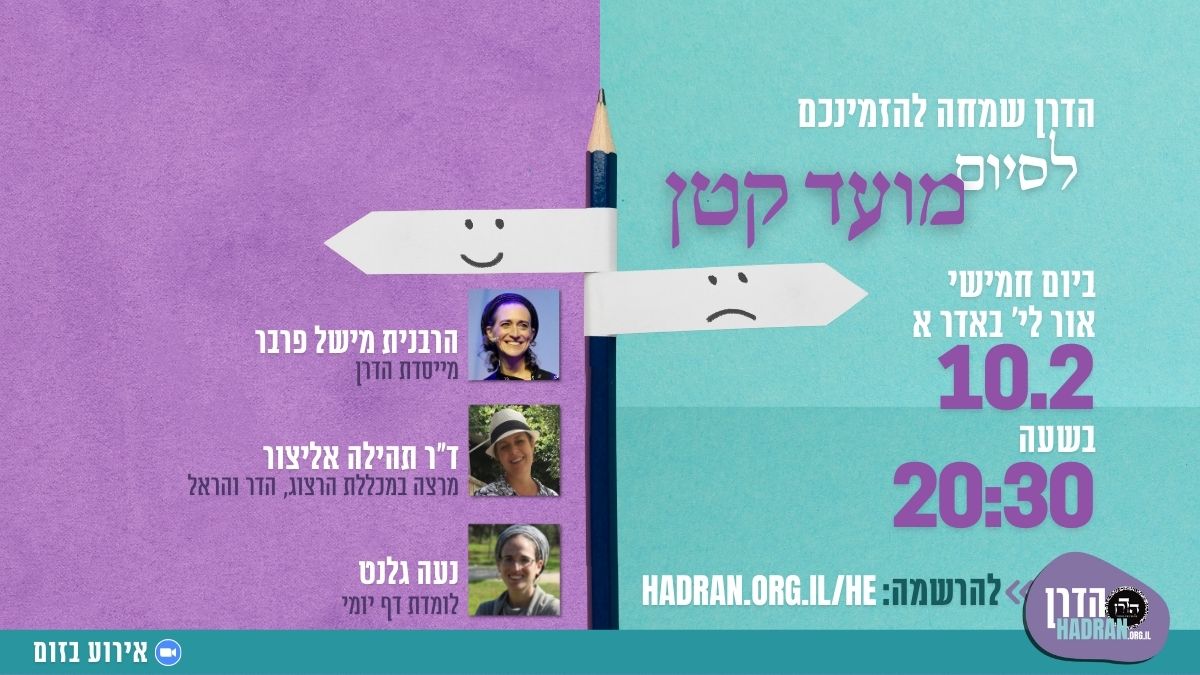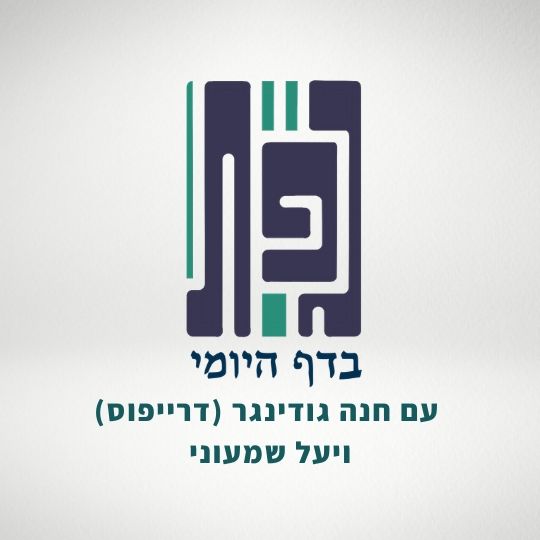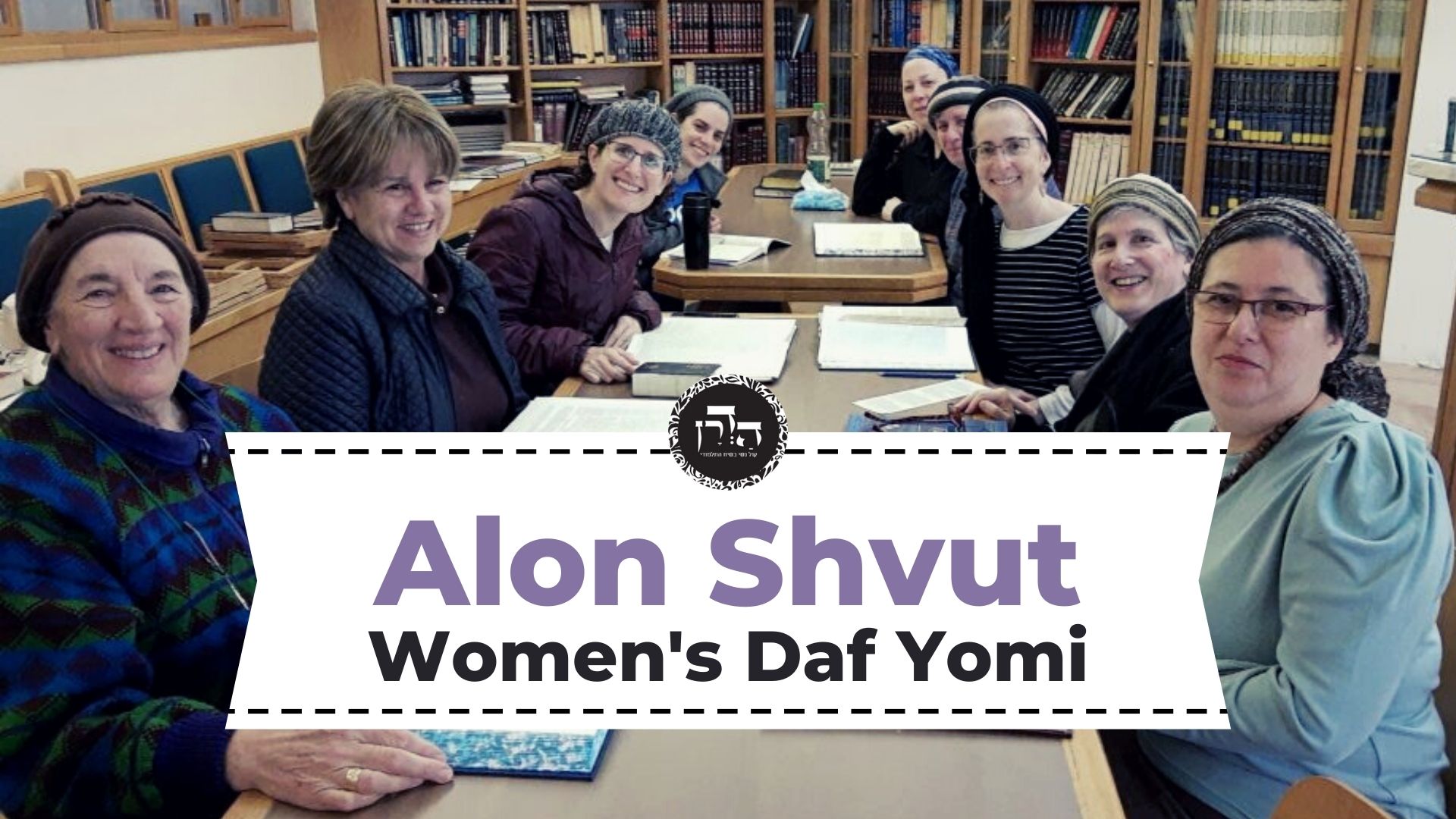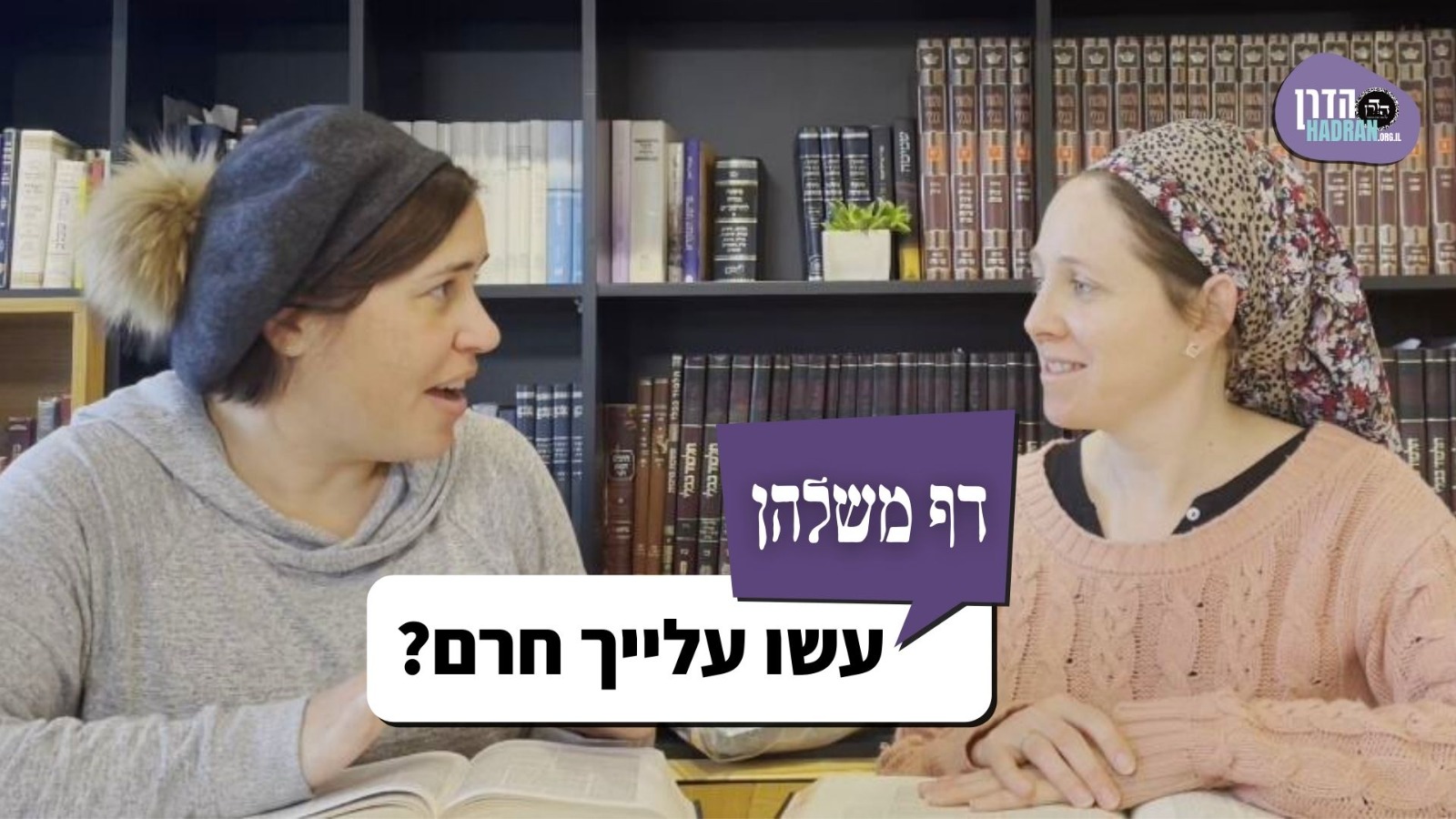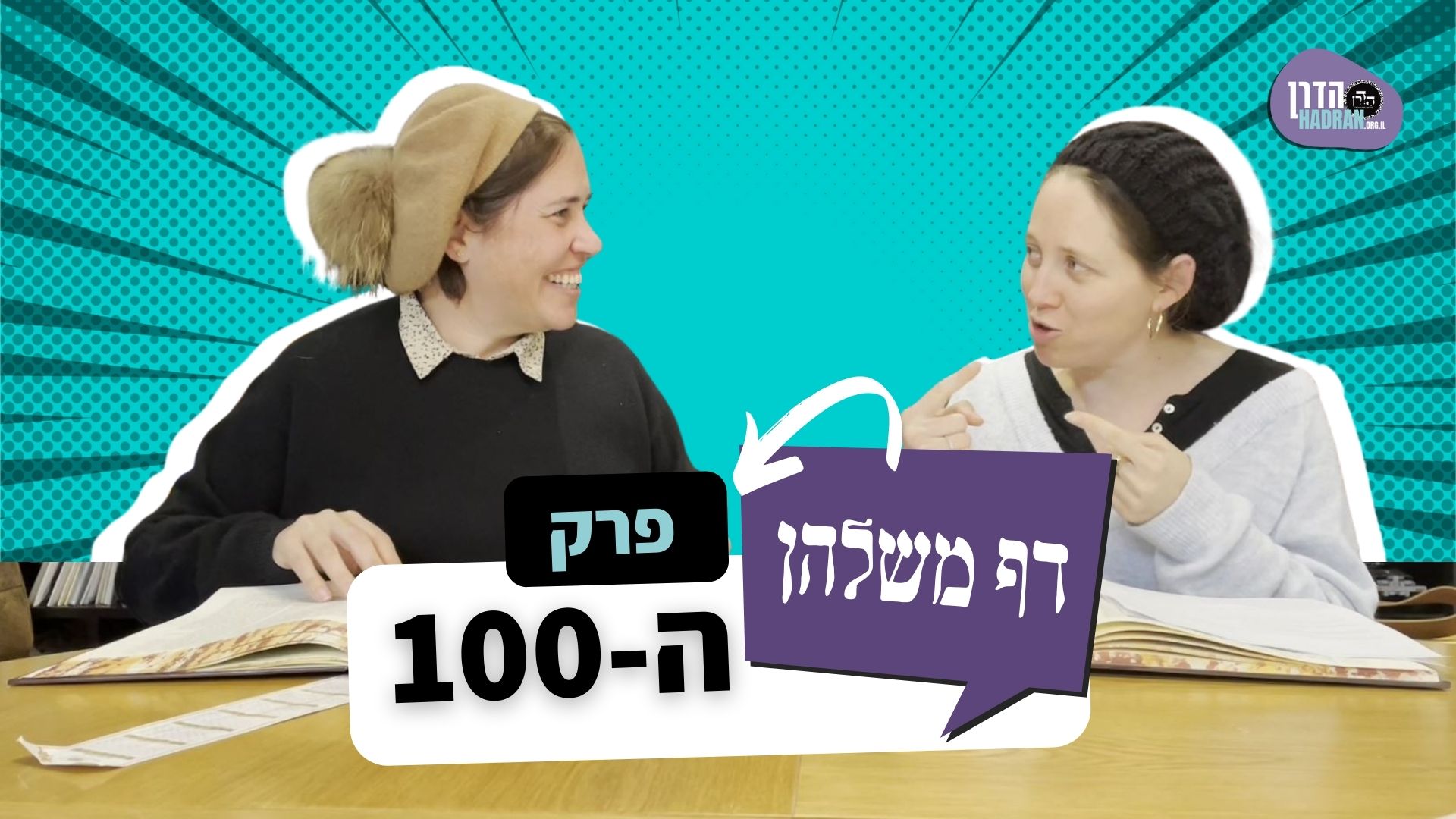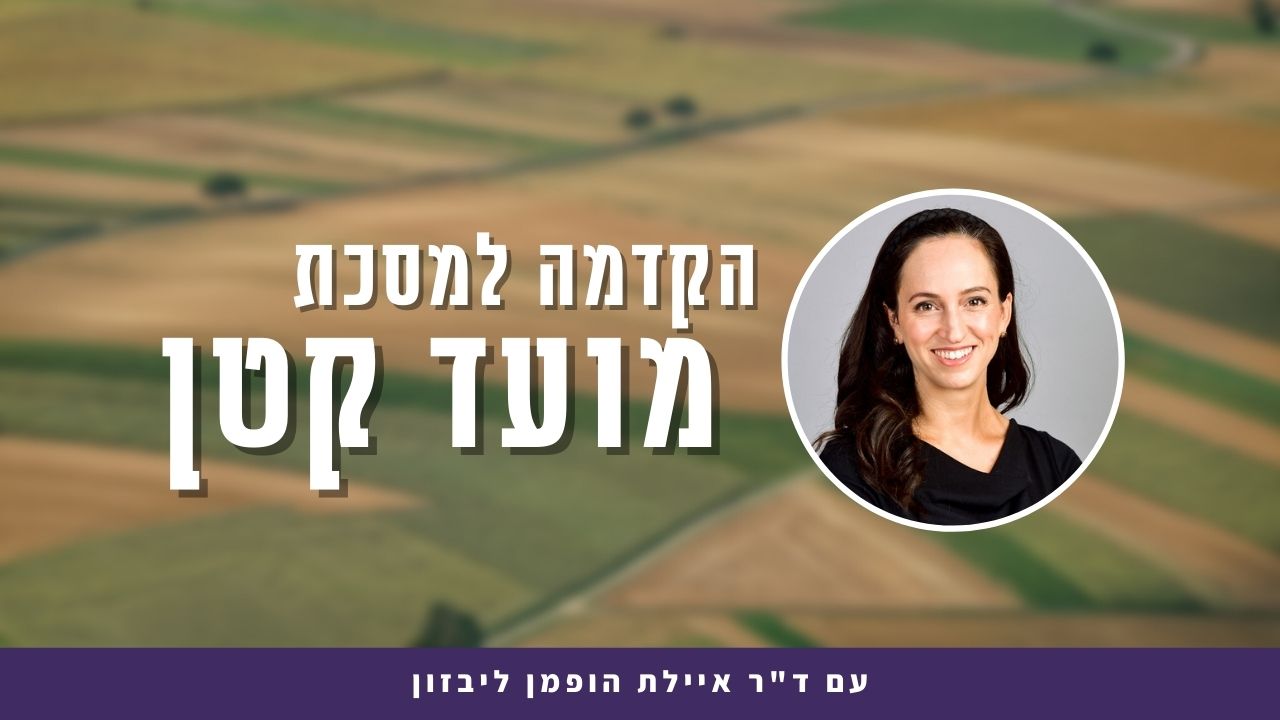מועד קטן כג
וְקוֹרִין שִׁבְעָה, וְיוֹצְאִין. רַבִּי יְהוֹשֻׁעַ בֶּן קׇרְחָה אוֹמֵר: לֹא שֶׁיֵּלְכוּ וִיטַיְּילוּ בַּשּׁוּק, אֶלָּא יוֹשְׁבִין וְדָוִוין.
and seven people read from the Torah. And then they leave and pray on their own. Rabbi Yehoshua ben Korḥa says: It is not that they stroll afterward in the marketplace, but rather they sit at home in silent mourning.
וְאֵין אוֹמְרִים שְׁמוּעָה וְאַגָּדָה בְּבֵית הָאֵבֶל. אָמְרוּ עָלָיו עַל רַבִּי חֲנַנְיָה בֶּן גַּמְלִיאֵל שֶׁהָיָה אוֹמֵר שְׁמוּעָה וְאַגָּדָה בְּבֵית הָאֵבֶל.
And furthermore, one may not speak about halakha or aggada in a house of mourning, as this is an activity that brings people joy. It was said of Rabbi Ḥananya ben Gamliel that he would speak about halakha and aggada in a house of mourning.
תָּנוּ רַבָּנַן: אָבֵל, שַׁבָּת רִאשׁוֹנָה — אֵינוֹ יוֹצֵא מִפֶּתַח בֵּיתוֹ, שְׁנִיָּה — יוֹצֵא וְאֵינוֹ יוֹשֵׁב בִּמְקוֹמוֹ, שְׁלִישִׁית — יוֹשֵׁב בִּמְקוֹמוֹ וְאֵינוֹ מְדַבֵּר, רְבִיעִית — הֲרֵי הוּא כְּכׇל אָדָם.
§ The Sages taught the following baraita: During the first week after his bereavement, the mourner may not go out of the opening of his house. During the second week, he may go out, but he may not sit in his usual place in the synagogue. During the third week, he may sit in his usual place but he may not speak. During the fourth week, he is like any other person.
רַבִּי יְהוּדָה אוֹמֵר: לֹא הוּצְרְכוּ לוֹמַר שַׁבָּת רִאשׁוֹנָה לֹא יֵצֵא מִפֶּתַח בֵּיתוֹ, שֶׁהֲרֵי הַכֹּל נִכְנָסִין לְבֵיתוֹ לְנַחֲמוֹ. אֶלָּא: שְׁנִיָּה — אֵינוֹ יוֹצֵא מִפֶּתַח בֵּיתוֹ, שְׁלִישִׁית — יוֹצֵא וְאֵינוֹ יוֹשֵׁב בִּמְקוֹמוֹ, רְבִיעִית — יוֹשֵׁב בִּמְקוֹמוֹ וְאֵינוֹ מְדַבֵּר, חֲמִישִׁית — הֲרֵי הוּא כְּכׇל אָדָם.
Rabbi Yehuda says: They did not need to say that during the first week the mourner may not go out of the opening of his house. This teaches us nothing new, as at that time everyone goes into his house to console him. Rather, during the second week, he may not go out of the opening of his house. During the third week, he may go out, but he may not sit in his usual place in the synagogue. During the fourth week, he may sit in his usual place, but he may not speak. During the fifth week, he is like any other person.
תָּנוּ רַבָּנַן: כׇּל שְׁלֹשִׁים יוֹם לַנִּישּׂוּאִין. מֵתָה אִשְׁתּוֹ — אָסוּר לִישָּׂא אִשָּׁה אַחֶרֶת עַד שֶׁיַּעַבְרוּ עָלָיו שְׁלֹשָׁה רְגָלִים. רַבִּי יְהוּדָה אוֹמֵר: רֶגֶל רִאשׁוֹן וְשֵׁנִי — אָסוּר, שְׁלִישִׁי — מוּתָּר.
§ The Sages taught another baraita: During the entire thirty-day period of mourning, it is prohibited to marry. If one’s wife died, it is prohibited to marry another wife until three Festivals pass since her death. Rabbi Yehuda says: Until the first and second Festivals have passed, he is prohibited from marrying; before the third Festival, however, he is permitted to do so.
וְאִם אֵין לוֹ בָּנִים — מוּתָּר לִישָּׂא לְאַלְתַּר מִשּׁוּם בִּיטּוּל פְּרִיָּה וּרְבִיָּה. הִנִּיחָה לוֹ בָּנִים קְטַנִּים — מוּתָּר לִישָּׂא לְאַלְתַּר מִפְּנֵי פַרְנָסָתָן.
And if he does not have children, he is permitted to marry another wife immediately due to the need to not neglect the mitzva to be fruitful and multiply. Since he has not yet fulfilled the mitzva of procreation, he is still required to marry a wife. Any delay might result in a lost opportunity for marriage. Similarly, if his wife died and left him young children, he is permitted to marry another wife immediately, so that she might take care of them.
מַעֲשֶׂה שֶׁמֵּתָה אִשְׁתּוֹ שֶׁל יוֹסֵף הַכֹּהֵן, וְאָמַר לַאֲחוֹתָהּ בְּבֵית הַקְּבָרוֹת: לְכִי וּפַרְנְסִי אֶת בְּנֵי אֲחוֹתֵךְ, וְאַף עַל פִּי כֵן לֹא בָּא עָלֶיהָ אֶלָּא לִזְמַן מְרוּבֶּה. מַאי לִזְמַן מְרוּבֶּה? אָמַר רַב פָּפָּא: לְאַחַר שְׁלֹשִׁים יוֹם.
There was an incident when the wife of Yosef the Priest died, and he said to her sister at the cemetery immediately after the funeral: Go and care for your sister’s children. In other words, he alluded that he wished to marry her immediately. But even though he married her immediately, he did not engage in sexual relations with her for a long time afterward. The Gemara asks: What is the meaning of the term: A long time? Rav Pappa said: After thirty days.
תָּנוּ רַבָּנַן: כׇּל שְׁלֹשִׁים יוֹם לְגִיהוּץ, אֶחָד כֵּלִים חֲדָשִׁים וְאֶחָד כֵּלִים יְשָׁנִים יוֹצְאִין מִתּוֹךְ הַמַּכְבֵּשׁ. רַבִּי אוֹמֵר: לֹא אָסְרוּ אֶלָּא כֵּלִים חֲדָשִׁים בִּלְבָד. רַבִּי אֶלְעָזָר בְּרַבִּי שִׁמְעוֹן אוֹמֵר: לֹא אָסְרוּ אֶלָּא כֵּלִים חֲדָשִׁים לְבָנִים בִּלְבָד.
§ The Sages taught yet another baraita: During the entire thirty-day period of mourning, it is prohibited to wear ironed garments, whether they are new garments or old garments taken out of the press, as ironed garments appear to be new. Rabbi Yehuda HaNasi disagrees and says: The Sages prohibited wearing only new garments. Rabbi Elazar, son of Rabbi Shimon, says: They prohibited wearing only new white garments.
אַבָּיֵי נָפֵיק בִּגְרָדָא דְסַרְבָּלָא כְּרַבִּי. רָבָא נָפֵיק בְּחִימּוּצְתָּא רוֹמִיתָא סוּמַּקְתָּא חַדְתִּי כְּרַבִּי אֶלְעָזָר בְּרַבִּי שִׁמְעוֹן.
The Gemara relates that Abaye went out while he was in mourning in an old white garment, in accordance with the opinion of Rabbi Yehuda HaNasi. Rava, on the other hand, went out in a new, red Roman cloak, as he acted in accordance with the opinion of Rabbi Elazar, son of Rabbi Shimon.
מִפְּנֵי שֶׁאָמְרוּ: שַׁבָּת עוֹלָה וְאֵינָהּ מַפְסֶקֶת. בְּנֵי יְהוּדָה וּבְנֵי גָלִילָא. הָנֵי אָמְרִי:
It was taught in the mishna: This is because the Sages said that Shabbat counts as one of the days of mourning, but it does not interrupt the mourning period, which continues after Shabbat. It is stated that with regard to mourning on Shabbat, there is a difference in practice between the residents of Judea and the residents of the Galilee. These say:
יֵשׁ אֲבֵילוּת בְּשַׁבָּת, וְהָנֵי אָמְרִי: אֵין אֲבֵילוּת בְּשַׁבָּת.
There is some mourning on Shabbat, i.e., with regard to mourning rites that can be observed privately in the mourner’s home and will go unnoticed by other people; whereas those say: There is no mourning on Shabbat at all.
מַאן דְּאָמַר יֵשׁ אֲבֵילוּת בְּשַׁבָּת, דְּקָתָנֵי ״עוֹלָה״. מַאן דְּאָמַר אֵין אֲבֵילוּת בְּשַׁבָּת, דְּקָתָנֵי ״אֵינָהּ מַפְסֶקֶת״.
The Gemara explains: The ones who said that there is some mourning on Shabbat rely on that which is taught, that Shabbat counts as one of the days of mourning, implying that some degree of mourning applies on that day. The ones who said that there is no mourning on Shabbat at all base this on that which is taught that Shabbat does not interrupt the mourning period.
אִי סָלְקָא דַעְתָּךְ יֵשׁ אֲבֵילוּת בְּשַׁבָּת, הַשְׁתָּא אֲבֵילוּת נָהֲגָא, אַפְסוֹקֵי מִיבַּעְיָא?
The latter argue as follows: If it should enter your mind to say that there is some mourning on Shabbat, there is a difficulty, for now that it has been stated that actual mourning applies on Shabbat, is it necessary to teach us that this day does not interrupt the mourning period? Rather, the conclusion must be that there is no mourning on Shabbat whatsoever.
וְאֶלָּא הָא קָתָנֵי ״עוֹלָה״! אַיְּידֵי דְּקָבָעֵי לְמִיתְנֵא סֵיפָא ״אֵינָן עוֹלִים״, תְּנָא רֵישָׁא ״עוֹלָה״.
The Gemara asks: But isn’t it taught in the mishna that Shabbat counts as one of the days of mourning, implying that it is just like the other days of mourning, and at least some mourning rites are practiced on it? The Gemara answers: Since the mishna wished to teach in the latter clause that the days of a Festival do not count toward the requisite days of mourning, it taught also in the first clause that Shabbat counts as one of the days of mourning, although no mourning rites are practiced on it.
וּלְמַאן דְּאָמַר יֵשׁ אֲבֵילוּת בְּשַׁבָּת, הָא קָתָנֵי אֵינָהּ מַפְסֶקֶת! מִשּׁוּם דְּקָבָעֵי לְמִיתְנֵא סֵיפָא ״מַפְסִיקִין״, תְּנָא רֵישָׁא ״אֵינָהּ מַפְסֶקֶת״.
The Gemara asks: And according to the ones who said that there is some mourning on Shabbat, isn’t it taught in the mishna that it does not interrupt the mourning period, which would have been unnecessary to say if the mourning rites are practiced on it? The Gemara answers: This was not necessary for itself, but due to the fact that the mishna wished to teach in the latter clause that the Festivals interrupt the mourning, it taught also in the first clause that Shabbat does not interrupt it.
לֵימָא כְּתַנָּאֵי: מִי שֶׁמֵּתוֹ מוּטָּל לְפָנָיו — אוֹכֵל בְּבַיִת אַחֵר. אֵין לוֹ בַּיִת אַחֵר — אוֹכֵל בְּבֵית חֲבֵרוֹ, אֵין לוֹ בַּיִת חֲבֵרוֹ — עוֹשֶׂה לוֹ מְחִיצָה עֲשָׂרָה טְפָחִים. אֵין לוֹ דָּבָר לַעֲשׂוֹת מְחִיצָה — מַחְזִיר פָּנָיו וְאוֹכֵל.
The Gemara asks: Let us say that this is parallel to a dispute between tanna’im with regard to whether or not some mourning rites are observed even on Shabbat, for it was taught in a baraita: One whose deceased relative is laid out before him eats in another room. If he does not have another room, he eats in the house of a friend. If he does not have a friend’s house available, he makes a partition ten handbreadths high between him and the deceased, so that he may eat. If he does not have material with which to make a partition, he averts his face from the dead and eats.
וְאֵינוֹ מֵיסֵב וְאוֹכֵל, וְאֵינוֹ אוֹכֵל בָּשָׂר וְאֵינוֹ שׁוֹתֶה יַיִן, וְאֵין מְבָרֵךְ וְאֵין מְזַמֵּן, וְאֵין מְבָרְכִין עָלָיו וְאֵין מְזַמְּנִין עָלָיו, וּפָטוּר מִקְּרִיאַת שְׁמַע וּמִן הַתְּפִלָּה וּמִן הַתְּפִילִּין, וּמִכׇּל מִצְוֹת הָאֲמוּרוֹת בַּתּוֹרָה.
And in any case, he does not recline while he eats, as reclining is characteristic of a festive meal; and he neither eats meat nor drinks wine; and he does not recite a blessing before eating to exempt others from their obligation; and he does not recite the formula to invite the participants in the meal to join together in the Grace after Meals, and they do not recite a blessing over him nor do others invite him to join in the Grace after Meals, as he cannot be a member of the three required to recite the formula. And he is exempt from the recitation of Shema, and from the Amida prayer, and from donning phylacteries, and from performing all of the mitzvot mentioned in the Torah.
וּבְשַׁבָּת — מֵיסֵב וְאוֹכֵל, וְאוֹכֵל בָּשָׂר וְשׁוֹתֶה יַיִן, וּמְבָרֵךְ וּמְזַמֵּן, וּמְבָרְכִין וּמְזַמְּנִין עָלָיו, וְחַיָּיב בִּקְרִיאַת שְׁמַע וּבִתְפִילָּה וּבִתְפִילִּין, וּבְכׇל מִצְוֹת הָאֲמוּרוֹת בַּתּוֹרָה. רַבָּן גַּמְלִיאֵל אוֹמֵר: מִתּוֹךְ שֶׁנִּתְחַיֵּיב בְּאֵלּוּ — נִתְחַיֵּיב בְּכוּלָּן.
But on Shabbat he reclines at the meal, as per his custom, and eats; and he eats meat and drinks wine; and he recites blessings to exempt others from their obligation; and he recites the formula to invite the participants in the meal to join together in the Grace after Meals, and others may recite blessings on his behalf and invite him to join in the Grace after Meals. And he is also obligated in the recitation of Shema, and in the Amida prayer, and in the mitzva of phylacteries, and in all the mitzvot mentioned in the Torah. Rabban Gamliel says: Since he is obligated to fulfill these mitzvot associated with Shabbat, he is obligated to fulfill all of the mitzvot on Shabbat.
וְאָמַר רַבִּי יוֹחָנָן: תַּשְׁמִישׁ הַמִּטָּה אִיכָּא בֵּינַיְיהוּ.
Rabban Gamliel’s statement is vague. The following clarifies it: Rabbi Yoḥanan said: The practical difference between them, the opinion of the anonymous first tanna and Rabbi Yoḥanan’s opinion, is with regard to sexual relations. According to Rabban Gamliel, the acute mourner is obligated in the mitzva to engage in marital intercourse with his wife on Shabbat, just as he is obligated in all the other mitzvot.
מַאי לָאו בְּהָא קָא מִיפַּלְגִי, דְּמָר סָבַר: יֵשׁ אֲבֵילוּת בְּשַׁבָּת, וּמַר סָבַר: אֵין אֲבֵילוּת בְּשַׁבָּת!
The Gemara asks: What, is it not with regard to this issue that they disagree: Is it not that one Sage, the anonymous first tanna, holds that there is some mourning on Shabbat with regard to private issues, and therefore the mourner does not engage in sexual relations; and one Sage, Rabban Gamliel, holds that there is no mourning on Shabbat at all?
מִמַּאי? דִּלְמָא עַד כָּאן לָא קָאָמַר תַּנָּא קַמָּא הָתָם, אֶלָּא מִשּׁוּם דְּמֵתוֹ מוּטָּל לְפָנָיו. אֲבָל הָכָא, דְּאֵין מֵתוֹ מוּטָּל לְפָנָיו — לָא.
The Gemara rejects this argument: From where do you reach this conclusion? Perhaps the first tanna is saying that it is prohibited for the grieving relative to engage in sexual relations in the case dealt with only there, because his deceased relative is laid out before him and has not yet been buried. But here, with regard to the period of mourning, when his dead has been buried and is no longer laid out before him, sexual relations are not prohibited.
וְעַד כָּאן לָא קָאָמַר רַבָּן גַּמְלִיאֵל הָתָם, דְּאַכַּתִּי לָא חָל אֲבֵילוּת עֲלֵיהּ. אֲבָל הָכָא, דְּחָל אֲבֵילוּת עֲלֵיהּ — הָכִי נָמֵי.
And alternatively, perhaps Rabban Gamliel is saying that the grieving relative is permitted to engage in sexual relations only there, where the halakhot of mourning have not yet taken effect, as mourning begins only after the burial. But here, where the halakhot of mourning have already taken effect, he may also prohibit sexual relations.

